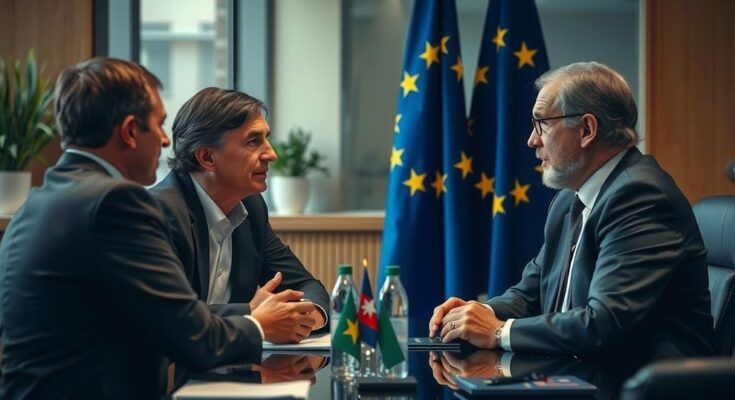Carolina Barrero met with Olof Skoog, the new EU Special Representative for Human Rights, discussing Cuba’s deteriorating human rights situation, the ineffective governance leading to humanitarian crises, and criticized EU’s aid reaching corrupt elites. She stressed the importance of engaging civil society in dialogues and called for support for political prisoners.
Cuban activist Carolina Barrero recently met with Olof Skoog, the EU’s new Special Representative for Human Rights, in a significant discussion held at the European External Action Service in Brussels. Barrero highlighted Cuba’s dire human rights situation, calling it a “failed state” with deteriorating conditions in energy, water supply, food security, and healthcare services. During the meeting, Barrero shared grave concerns about the ineffective policies of the Cuban government, which she asserted have precipitated a humanitarian crisis causing multiple deaths within the populace. She remarked on the neglect of power generation infrastructure, emphasizing that the facilities are over 40 years old without any updates or repairs. Barrero criticized the EU’s aid efforts, claiming they benefit only a corrupt elite in Cuba rather than the general population. The discussion also covered important issues such as the plight of political prisoners and the urgent need for the EU to advocate for their release. Barrero expressed dissatisfaction with a previous visit by Eamon Gilmore, stressing the need for genuine engagement with civil society. Skoog, who has been in office since March, aims to enhance human rights dialogues with international partners. Barrero urged him to engage openly with Cubans rather than in secrecy, as has often been the case with European officials visiting the country. She emphasized that the growing Cuban civil society deserves recognition and respect from the European Union.
The meeting between Carolina Barrero and Olof Skoog underscores the pressing human rights issues in Cuba, where government failures have resulted in a humanitarian crisis. The challenges include outdated infrastructure, lack of resources, and suppression of civil society voices. The EU has been urged to reconsider its approach to aid and support, ensuring it reaches those in need rather than reinforcing existing power structures.
The meeting illustrated the urgent need for a shift in the European Union’s engagement strategy with Cuba, advocating for direct dialogue with civil society. Barrero’s insistence on recognizing the growing civil movement in Cuba reflects a broader call for accountability from international partners. Her passionate advocacy aims to draw attention to the suffering endured by the Cuban population and to call for meaningful reforms.
Original Source: en.cibercuba.com



